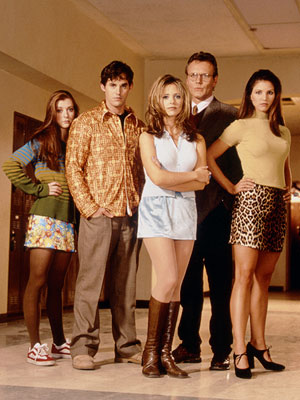I usually hate “according to” posts where someone makes a tenuous connection between some show or a book then talks about all the lessons to be learned. Buffy the Vampire Slayer has been done before (see the bottom of this post), but ideas for this just kept bouncing in my head so I thought I’d write it up to get them out of there (sorry!).
Buffy the Vampire Slayer was conceived of by Joss Whedon around the idea of a “perfect victim” from slasher and horror films, a young blond woman, who suddenly and unexpectedly pummels a monster that attacks her in a dark alley. The show builds on this idea of misdirection and sudden changes from the first scene of the first episode.
Rely on Your Friends
 Each of Buffy’s friends had their own specials abilities and expertise. Giles, her mentor, was a master of research, her friend Willow was a powerful witch, and both her vampire boyfriends were kick-ass fighters. Something that comes out over the course of the show, after we’ve seen other slayers in action, is that Buffy’s greatest ability isn’t a supernatural one: she’s an amazing leader. As well as planning high level strategy and raising to whatever the occasion demands, she also brings out the best in those around her, inspires loyalty and trust (and manages to return it, even though she’s betrayed by a trusted one in every season of the show).
Each of Buffy’s friends had their own specials abilities and expertise. Giles, her mentor, was a master of research, her friend Willow was a powerful witch, and both her vampire boyfriends were kick-ass fighters. Something that comes out over the course of the show, after we’ve seen other slayers in action, is that Buffy’s greatest ability isn’t a supernatural one: she’s an amazing leader. As well as planning high level strategy and raising to whatever the occasion demands, she also brings out the best in those around her, inspires loyalty and trust (and manages to return it, even though she’s betrayed by a trusted one in every season of the show).
No one can be an expert in all things. It’s invaluable to have contacts to go to for advice about how to evict a tenant, what would be a reasonable asset allocation for your stage in life or how to structure your will to be as tax efficient as possible.
 Sometimes the best opportunities come from unexpected directions if we’re open to them. Job leads can come from someone you never expected to be able to help your career, and warnings about potential pitfalls with an investment you’re considering can come from the least expected source. Throughout the series, Xander is considered one of Buffy’s least useful friends (he causes more problems then he solves). His only real ability seems to be that supernatural females find him very attractive (and this mostly causes problems as well). Nevertheless, he manages to save the world at the end of one season by talking about yellow crayons. Unexpected? yes. Helpful? Definitely!
Sometimes the best opportunities come from unexpected directions if we’re open to them. Job leads can come from someone you never expected to be able to help your career, and warnings about potential pitfalls with an investment you’re considering can come from the least expected source. Throughout the series, Xander is considered one of Buffy’s least useful friends (he causes more problems then he solves). His only real ability seems to be that supernatural females find him very attractive (and this mostly causes problems as well). Nevertheless, he manages to save the world at the end of one season by talking about yellow crayons. Unexpected? yes. Helpful? Definitely!
Rely on Yourself
 When the situation calls for it, Buffy doesn’t hesitate to roll up her sleeves and get to work on her own. As the prophesy tells her, and she tells her friends: “…Into each generation a girl is born, a chosen one. She alone will wield the strength and skill needed to fight the vampires, demons, and the forces of darkness, stopping the swell of their numbers and the spread of their evil. She is the slayer…”.
When the situation calls for it, Buffy doesn’t hesitate to roll up her sleeves and get to work on her own. As the prophesy tells her, and she tells her friends: “…Into each generation a girl is born, a chosen one. She alone will wield the strength and skill needed to fight the vampires, demons, and the forces of darkness, stopping the swell of their numbers and the spread of their evil. She is the slayer…”.
We’ve written extensively about real estate agents (not that I’m calling them forces of darkness or anything…), but it applies in all venues of life. You’re asking for trouble if you blindly trust your insurance agent, lawyer, doctor, teacher, spouse or broker. No one is invested in looking out for you as much as you yourself. Trust others, but don’t turn off your brain when you do so.
Expect Changes in Your Environment
 In each season of Buffy there’s a “big bad” she has to deal with (a powerful monster with a plan to rule the world). Usually dealing with them involves learning about them, discovering their weakness, laying a plan, then going to battle (while dealing with minor problems each week leading up to this). Each season the major villain is radically different (and in only 2 of the 7 season were they actually vampires). If we optimize our finances for the problems of the past, we’re going to get ourselves in trouble. Sub-prime might be the “big bad” of 2008, but its not going to be the “big bad” of 2009. Avoiding tech stocks in 2002 didn’t do you much good. The big changes are going to be caused by unexpected (and assumed to be improbable) events.
In each season of Buffy there’s a “big bad” she has to deal with (a powerful monster with a plan to rule the world). Usually dealing with them involves learning about them, discovering their weakness, laying a plan, then going to battle (while dealing with minor problems each week leading up to this). Each season the major villain is radically different (and in only 2 of the 7 season were they actually vampires). If we optimize our finances for the problems of the past, we’re going to get ourselves in trouble. Sub-prime might be the “big bad” of 2008, but its not going to be the “big bad” of 2009. Avoiding tech stocks in 2002 didn’t do you much good. The big changes are going to be caused by unexpected (and assumed to be improbable) events.
Build on your Expertise

 Buffy didn’t try to train Willow as a slayer, and Willow didn’t try to train Buffy as a witch. As Mike has written about before, often the best thing you can do when the apocalypse is coming is invest in your career, do the best job you can and build on that as your greatest asset.
Buffy didn’t try to train Willow as a slayer, and Willow didn’t try to train Buffy as a witch. As Mike has written about before, often the best thing you can do when the apocalypse is coming is invest in your career, do the best job you can and build on that as your greatest asset.
This can get away from us at times, as happened when her power over-whelmed her and Willow became dark Willow. She didn’t let that career setback finish her and she got back to doing what she does best (casting those magic spells).
Do What it Takes
 When money got tight, did Buffy decide minimum wage was beneath her and go on welfare or compromise her morals and earn money illegally? Nope, she started working at a fast food joint. It wasn’t beneath her and its not beneath any of us if that’s what the occasion demands. If a superhero can do whatever it takes to put food on the table, so can we.
When money got tight, did Buffy decide minimum wage was beneath her and go on welfare or compromise her morals and earn money illegally? Nope, she started working at a fast food joint. It wasn’t beneath her and its not beneath any of us if that’s what the occasion demands. If a superhero can do whatever it takes to put food on the table, so can we.
Life’s Not Fair
 Originally Riff Regan was going to play Willow, but after seeing the unaired pilot, the studio wanted someone more attractive to play the “ugly girl”. Unfair? Totally. But life is unfair and we have to play the cards we’re given. Maybe you’re not the right gender, or the right race, or the right sexuality or have the right accent to do what you want. Maybe you’re not tall enough, thin enough, smart enough or experienced enough to land the position you’re desperately after.
Originally Riff Regan was going to play Willow, but after seeing the unaired pilot, the studio wanted someone more attractive to play the “ugly girl”. Unfair? Totally. But life is unfair and we have to play the cards we’re given. Maybe you’re not the right gender, or the right race, or the right sexuality or have the right accent to do what you want. Maybe you’re not tall enough, thin enough, smart enough or experienced enough to land the position you’re desperately after.
It happens to everyone. And you shrug your shoulders, feel bad for a little while, then carry on with your life.
And maybe call Buffy and ask for her help.
Other posts about Buffy and finances are available from Finance Freelance Life, her Buffy themed carnival, Living Behind the Curve, Lazy Man and Money (actually about the actress, not the character), and advice to Buffy about her financial problems.








